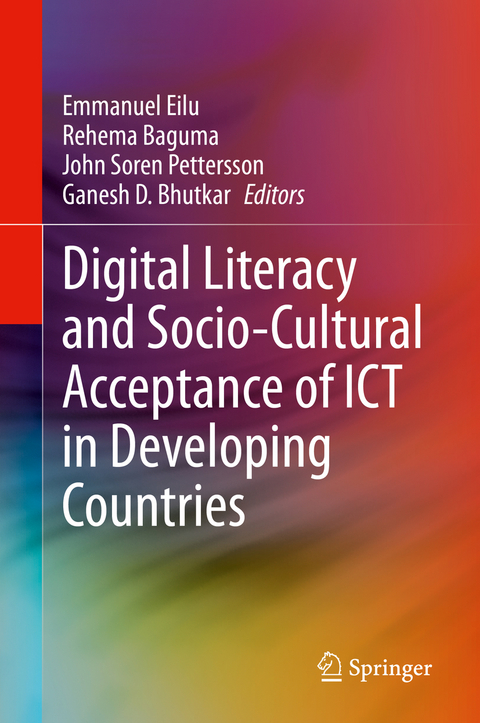
Digital Literacy and Socio-Cultural Acceptance of ICT in Developing Countries
Springer International Publishing (Verlag)
978-3-030-61088-3 (ISBN)
This book discusses the role of human computer interaction (HCI) design in fostering digital literacy and promoting socio-cultural acceptance and usage of the latest ICT innovations in developing countries. The book presents techniques, theories, case studies, and methodologies in HCI design approaches that have been used to foster digital literacy, break the socio-cultural barriers to ICT adoption, and promote the widespread usage of the latest innovations in the health, agriculture, economic, education and social sectors in developing countries. The authors provide insights on how crossing disciplines in HCI such as usability design, user centered design, user experience, anticipated user experience, technology acceptance design, persuasive design, philosophical designs, motivational design, social-cultural oriented designs, and other HCI design approaches have promoted digital literacy and stimulated socio-cultural acceptance and the usage of the latest ICT innovations. The book is relevant in academic, industry and government.
- Presents theoretical, practical, and socio-cultural approaches to digital literacy challenges in developing countries;
- Discusses recent ICT and HCI innovations used to transform the health, agriculture, economic, education and social sectors in developing countries;
- Provides insights on design opportunities and challenges presented in countries where digital literacy is very low and with complex socio-cultural dynamics.
lt;p>Emmanuel Eilu holds a Ph.D. in Information Technology and a Master's of Science in Information Technology. His areas of research are in Human-Computer Interaction (Usability, User Experience and Anticipated UX), Electronic Government and ICT for Development Research (Adoption of E-Government Systems; E-governance; E-voting; Biometric Voter Registration Systems; Electronic Civil Registers, E-Health and M-agriculture). Dr. Eilu has been teaching both postgraduate and undergraduate programs at the School of Computing and IT - Makerere University. He also lectured at the International University of East Africa-Uganda. Currently, he teaches at Uganda Christian University-Mbale University College and coordinates a master's program at the Department of Computing. His major teaching area includes; Research Methods, Human-Computer Interaction, Computer Networks, Computer Security, Information Systems Security, Strategic Information Systems Management, and E-governance. He has widely published. Dr. Eilu has also worked as a Data Analyst Consultant for international NGOs.
Rehema Baguma is a senior lecturer of Information Systems. She holds a Ph.D. in Information Systems from Radboud University, the Netherlands. Dr. Rehema also holds a Bachelor of Library and Information Science; a Post Graduate Diploma in Computer Science; a master of Computer Application Technology and a Ph.D. in Information Systems. She is a researcher in web systems, web accessibility and computing solutions for the physically disabled. Dr. Baguma has accrued extensive experience in managing academic records systems
John Soren Pettersson is a full professor of Information Systems at Karlstad University in Sweden. His focus is in methodological support within the area of Human-Computer Interaction. Prof. Pettersson initiated and led the development of Ozlab, a system for making non-programmed prototypes interactive, 2001-2003. Presently, a web-based version has been developed by which co-design activities can be made on distance as well as ordinary walkthroughs and usability tests
Ganesh D. Bhutkar is a Usability Researcher and Academician. He is a Coordinator, Centre of Excellence in Human-Computer Interaction (HCI) and also, Assistant Head (Research), Department of Computer Engineering at Vishwakarma Institute of Technology (VIT), Pune, India. His research work is mainly focused on HCI, Artificial Intelligence, Medical Usability and Assistive Technology. He has a Ph.D. in HCI from Indian Institute of Technology (IIT), Bombay. He is an active member of ACM as well as SIGCHI and also, a Vice Chair of a work group - IFIP 13.6 - Human Work Interaction Design (HWID). He has delivered invited talks and also, participated in research events across Europe, Africa, and Asia. His research team has developed a utility Android app - Eye+ for visually impaired users, which was also nominated for National Award.
Introduction.- HCI design challenges and opportunities in smart farming.- Current HCI issues and novel experiences in E-health.- Interaction techniques and technologies applicable to E-Learning scenarios.- Motivational and socio-cultural designs in E-participation.- Usability, acceptance & user experience issues in E-government.- Current persuasive, social and user experience approaches used in social computing.- Conclusion.
| Erscheinungsdatum | 02.06.2021 |
|---|---|
| Zusatzinfo | VIII, 313 p. 85 illus., 70 illus. in color. |
| Verlagsort | Cham |
| Sprache | englisch |
| Maße | 155 x 235 mm |
| Gewicht | 643 g |
| Themenwelt | Informatik ► Software Entwicklung ► User Interfaces (HCI) |
| Technik ► Elektrotechnik / Energietechnik | |
| Technik ► Nachrichtentechnik | |
| Wirtschaft ► Betriebswirtschaft / Management ► Unternehmensführung / Management | |
| Schlagworte | Developing Countries and social computing • Digital Literacy • Human Computer Interaction • Smart Farming • Socio-Cultural computing |
| ISBN-10 | 3-030-61088-8 / 3030610888 |
| ISBN-13 | 978-3-030-61088-3 / 9783030610883 |
| Zustand | Neuware |
| Haben Sie eine Frage zum Produkt? |
aus dem Bereich


